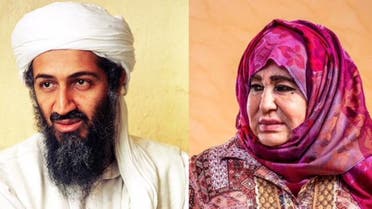Osama bin Laden’s mother breaks her silence seven years after his death
Finally, Aliya Ghanem, the mother of Osama bin Laden, founder and leader of al-Qaeda, appeared in a Western media outlet seven years after the death of her son at his Abbottabad residential compound, to break her silence and speak about her son who kept the international intelligence services on their toes for more than a decade.
What’s most interesting are the details she revealed about visiting her son in Afghanistan in 1999, two years before the September 11 attacks.
On this exciting visit, Al Arabiya English sheds light on the reasons for this visit and its implications, revealing more of Bin Laden’s secret life and his relationship with his mother Aliya Ghanem “Al Alawiya”, along with her husband Mohammed Al-Attas, who had a crucial role in the life of the al-Qaeda leader.
In Omar Bin Laden’s memoirs entitled “He’s Bin Laden”, co-written with his mother Najwa Ghanem, the nephew of Aliya Ghanem, Osama’s mother, the search focused on getting more information about the nature of the family relationship, which Osama had with his mother Aliya Ghanem “Al Alawiya” and his stepfather Mohammed Al Attas.
According to the description of al-Qaeda leader Osama, his mother, Aliya Ghanem, was a “strong and strict woman,” but her marriage to Osama’s father, Mohammed Awad bin Laden, did not last long after she asked for a divorce after losing a child in her second pregnancy.
Osama bin Laden would become the only child his mother had, after he lost a brother or a sister, following the injury of his mother who had an accident when operating the washing machine where she suffered from a trauma in the chest and belly.
Aliya took her son Osama, who was a child at the time and left the Bin Laden family compound. She lived with her husband Mohammed al-Attas, who became Osama’s step farther. Aliya and her husband became the secret circle of Osama and his source of nurturing and protection.
According to Omar bin Laden, "My father never left my mother’s house except for some visits to the Bin Laden compound,” adding that “although Mohammed al-Attas worked for Bin Laden, his private life remained separate from him, and my grandmother left the inner circle of the Bin Laden’s family, as well as my father, until he became a teenager and returned to the family on a more routine basis.”
In a house in Jalalabad, known as the Old Palace ( which belonged to king Mohammed Zahir Shah and was used for hunting), Aliya, accompanied by her husband Mohammed al Attas, met her son, Osama bin Laden in 1999, in a two-story villa near the Kabul River and surrounded by large gardens given to them by Mullah Nurullah Nouri, one of the warlords in Afghanistan since the Soviet war, after Osama, his wives and children returned from Sudan.
This would become the third visit of Aliya to her son. She had previously visited Khartoum, the Sudanese capital, twice.
Osama himself drove her from the airport, which was very rare especially after he left Saudi Arabia, according to Omar bin Laden: “As usua,l we carried Kalashnikovs and bomb belts, without thinking how we would we look to our family visitors who were not accustomed to our Jihad world. My father and I finally stood watching the plane arrive. I tried to resemble my father’s calm and serene attitude but I barely could contain my excitement. My grandmother and her husband finally appeared at the door of the open plane and waved with their hands before they started to get off on the stairs.”
In the meantime, Osama bin Laden noticed that his mother was not wearing a veil, and that her face was not covered so he quickly instructed her with hand gestures to cover her face. She held the tip of her scarf and wrapped it around her face and eyes which led to her losing control over her walk. “Her son Osama rushed to catch her so she wouldn’t fall.”
Omar added: “The mother quickly caught up with her son, holding hands together. They both entered in their own world. I never saw pure happiness as I did that day, that day I knew that my father was as happy as a man could be.”
After the car started, Omar was so happy that he felt the need to celebrate by firing bullets in the air, which worried her husband, Mohammed al-Attas, “thinking they were being attacked.”
Omar stated: “My grandmother offered her husband the most beautiful house to stay in. After that, they both went to my mother’s house (Najwa Ghanem). My grandmother brought with her chocolates as gifts. My brothers and I were so happy. We have not seen or eaten chocolate since our stay in Khartoum. As a matter of fact, some of my youngest brothers did not know what candy was.”
He added: “The first evening was the only night the whole family got together, we had so much fun. My father told us fun stories from his young years.”
The mother’s visit to her son Osama in Jalalabad was the last attempt to persuade him to return to Saudi Arabia. According to what Omar stated, “My grandmother came to Afghanistan to appeal to my father to give up jihad and return home. The grandmother Aliya said that he stills has a chance. King Fahd made him one last offer, promising that my father will not be jailed or handed over to the Americans, but he will have a quiet life if only he would go back to Saudi Arabia.”
Osama bin Laden’s answer, as Al Qaida leader, was well known, “I can never go back to the kingdom, my eyes will never see the land again, and my feet will never walk in the streets of Jeddah.”
With the exception of what Osama bin Laden proudly mentioned about the accomplishments of his father, whoever reads the memoirs will only find traces of pain and grief that al-Qaeda leader Osama bin Laden held against his father.
Here, keeping in mind the divorce of his mother from his father, it is worth pondering to what extent did the exclusion of Osama from the Bin Laden family, the only son of his mother and brotherless, affected him and contributed to the creation of the “bleak” personality that led to the founding of al-Qaeda and how he quickly followed the teachings of his theoretician Abdallah al-Azzam.
Indeed, Osama spent a lot more time with his Syrian uncles and had spent his holidays in the city of Lattakia, in comparison to the cruel treatment he received from his father Muhammad Awad bin Laden, who only met with his son three times, according to the memoires.
It is not surprising that the lack of his father’s presence in the life of his son negatively reflected on the life of Osama which was clearly evident in the personality of al-Qaeda leader.
Mohammed Awad bin Laden had fathered 55 sons and daughters out of his 22 marriages.
The cruelty and malice of Mohammed Awad bin Laden, the father of Osama, crystalized in more than one story told by Osama himself, where he bitterly recounted the time his father mercilessly slapped him on the face when he was a child because he was not standing right within the line with his brothers saying: “I remember when he called his sons for a meeting for some reason, and he had this strict rule. Whenever he met with his children, they had to line up in a very straight line according to length and not age. That day two of my older brothers, who were taller than me, put me in the middle, so I stood there silently. But your grandfather noticed, and became angry and walked to stand in front of me, and slapped me without any warning. His wrath was so great that I almost fell to the ground, I never forgot the pain of that slap, and I still carry that bitterness in my heart and face.”
Osama bin Laden’s psychological attitude towards his father is also reflected in the fact that he did not call him “my father” but he only refers to him as “your grandfather”.
According to the stories told by Osama bin Laden, the latter only met once with his father when he was no more than 9 of age.
This story was told during a friendly chat that he had with his son Omar when they were sitting in the caves of Tora Bora.
Osama told his son that he had requested a meeting with his father to express his desire to own a car, saying: : “ I only had one face to face experience with your grandfather, a year or so before he was killed.”
Osama added: “The day finally came, and Muhammad al-Attas led me to your grandfather’s office in Jeddah. He was sitting behind the biggest desk I ever saw in my life. He looked at me without smiling, and then said: 'What do you wan,t son?'”
Mohammad al-Attas encouraged me by tapping on my shoulder to appease my agitation, because your grandfather recognized me, he was famous for not knowing his children at all, and he would always ask them to identify themselves by saying the name of his mother, but my father knew that I was his son and now I realize that the reason behind that is that Mohammad was my companion, and your grandfather knew the husband of his ex-wife, but that day I did not connect the dots, I just felt very happy just because he knew who I was.”
After Osama’s visit to his father, he did not get the red car he wanted because his father refused his request and sent him a red bicycle instead. “I was shocked but I knew I would be beaten if I objected to his decision.”
“He examined the paper in front of him at the desk, alluding to the fact that he did not have time to waste, I thanked him and I left without us saying goodbye and I think it was the last time I saw your grandfather.”
Through reading the memoirs and what Osama bin Laden said, it appears that his stepfather, Mohammed al-Attas, was the substitute for the loss of his father.
As Osama told his son Omar: “Mohammad al-Attas was the nicest stepfather. He spared no effort to make me feel better on our way back home, telling me that I am going to get a new bike and cheering me up.”
Probably, his stepfather, Mohammed al-Attas, did not realize the challenges he will have to face for more than two decades due to his only stepson Osama bin Laden. Yet his troubles did not end, since his son, Hamza bin Laden, inherited the leadership and command of al-Qaeda from Iran to Afghanistan and Syria, for a period that only God knows how much it will last.
-

Can US ensure release of Pakistani doctor who helped CIA reach Osama bin Laden?
The United States is said to have established high-level contact with Pakistani ... Features -

Saudi Crown Prince slams ‘harmful’ Iran for sheltering Osama bin Laden’s son
Saudi Crown Prince Mohammed bin Salman’s highly-anticipated interview on ... Gulf -

Al-Qaeda figurehead Hamza bin Laden mourns death of oldest son Osama
Various social media users shared late Sunday a letter written by al-Qaeda ... Middle East -

How Osama bin Laden plotted for son to inherit al-Qaeda
The CIA has revealed on new details on the life of al-Qaeda’s late leader Osama ... Features
